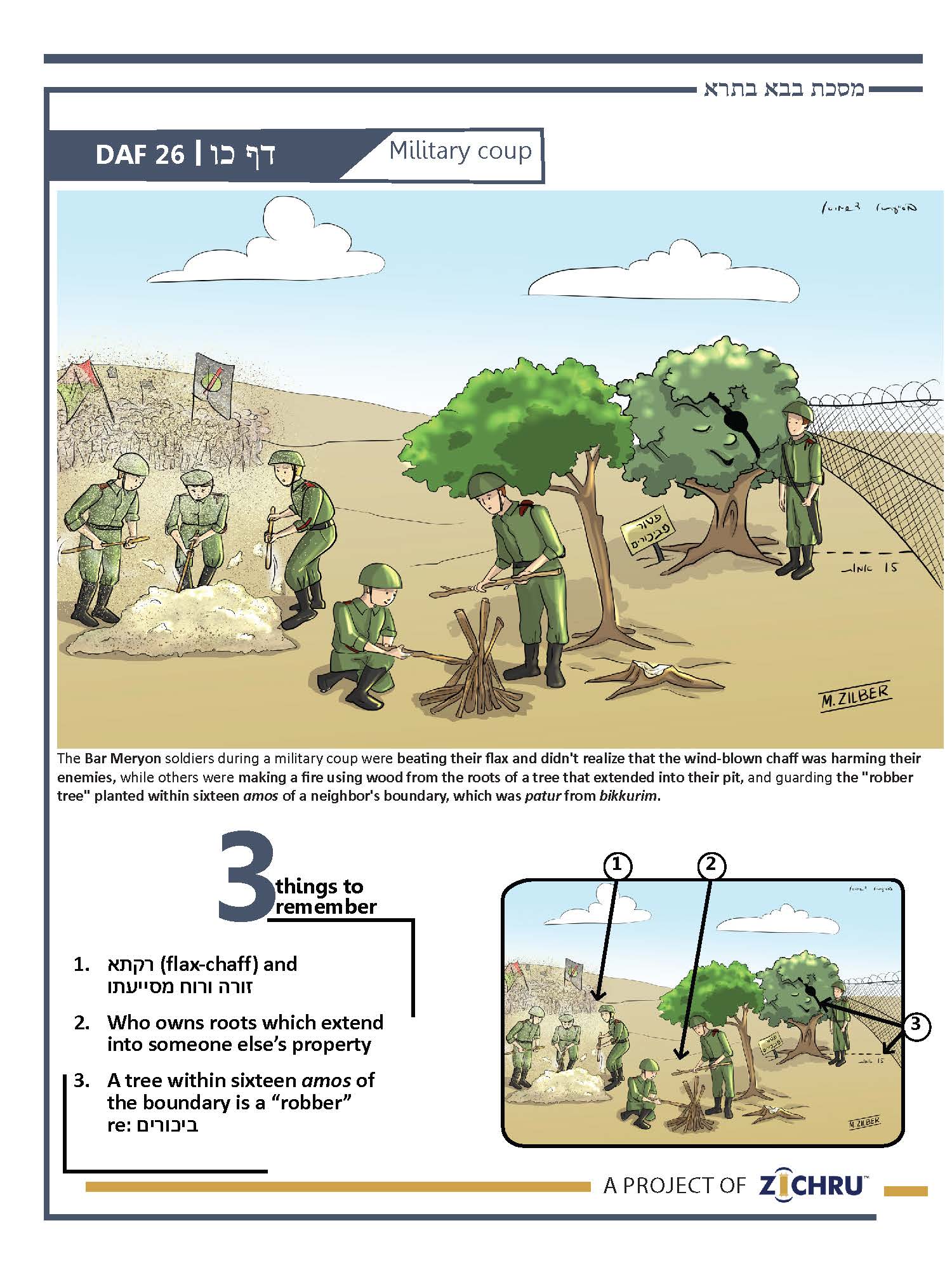Bava Basra - Daf 26
- Audio Timestamps
0:00 - The 3 Sugyos
3:10 - Review of 3 Sugyos
6:14 - Siman
9:09 - 4 Blatt Back Chazarah
18:00 - Pop Quiz (Last 7 Blatt)
For access to all Zichru resources including PDFs, and illustrations CLICK HERE
- רקתא (flax-chaff) and זורה ורוח מסייעתו
When the household of Bar Meryon would beat their flax, the רקתא – chaff would fly off and harm people. Ravina ruled they did not need to move away, because the law of "גירי דיליה" is only דקא אזלא מכחו – where [the damaging item] moves through his force, whereas this chaff, זיקא הוא דקא ממטי לה – it is the wind which carries it until it damages and is not their responsibility. Mar bar Rav Ashi asked, how is this different from זורה ורוח מסייעתו – one who winnows on Shabbos with the wind’s assistance, who is liable? Mereimar held it is similar to winnowing on Shabbos and would require the flax-beaters to move. Rashi explains that Ravina can reject the comparison to Shabbos, which is liable for מלאכת מחשבת – purposeful labor, and liable even when harnessing an outside force. The Gemara further challenges Ravina: how is flying chaff different from גץ היוצא מתחת הפטיש – a spark which shoots out from a blacksmith’s hammer, where one is liable for its damages!? It answers: התם ניחא ליה דליזל – there, [the blacksmith] prefers that [the spark] should fly away from his own property and strikes hard enough that the sparks fly off without the wind, whereas here, he does not prefer that the chaff leave his property, and it would remain if not for the wind.
- Who owns roots which extend into someone else’s property
The next Mishnah teaches that if roots of one’s tree extend into a neighbor’s property, he may dig three tefachim down and remove any roots, so they should not block his plow, and if he digs a pit, he may cut the roots downwards as far as he needs, והעצים שלו – and the wood is “his.” Rav Chisda was asked who owns the wood, and he quoted a Mishnah stating that if roots of a privately owned tree extend into hekdesh property, לא נהנין – one may not benefit from the roots (which is Rabbinically prohibited), ולא מועלין – but does not transgress me’ilah for benefiting from them. The roots must belong to the tree’s owner, for otherwise they would be hekdesh, and would incur me’ilah!? However, the Gemara asks that the reverse can be proven from the סיפא, that if roots of hekdesh extend into private property, they also do not incur me’ilah, indicating they do belong to the property owner!? Rather, this Mishnah is discussing roots which grew after the tree was declared hekdesh, and the Tanna holds אין מעילה בגידולין – there is not me’ilah for new growths, and nothing can be proven from the Mishnah. Ravina said that the first case refers to roots within sixteen amos of the tree, which belong to the tree’s owner (since they provide the primary nourishment), and the second case refers to roots beyond sixteen amos.
- A tree within sixteen amos of the boundary is a “robber” re: ביכורים
Ulla said: אילן הסמוך למצר בתוך שש עשרה אמה – A tree which is within sixteen amos of the boundary גזלן הוא – is a “robber” by drawing nourishment from the neighboring field, ואין מביאין ממנו בכורים – and therefore, one does not bring bikkurim from [its fruits]. Rashi explains that because the Torah commanded to bring ביכורים from fruit “which you bring from your land,” so fruit which drew nourishment from another person’s land is exempt. The Gemara will seek the source that trees derive nourishment from within sixteen amos.
On Daf 27b, Rav Dimi quotes Rebbe Yochanan making the same ruling. However, Ravin quoted Rebbe Yochanan saying that whether a tree is planted near a boundary, or its branches extend over a neighbor’s property, one brings ביכורים from its fruit and recites the ביכורים pesukim, שעל מנת כן הנחיל יהושע לישראל את הארץ – for it was on this condition (of allowing this practice) that Yehoshua apportioned Eretz Yisroel to Yisroel.
Siman - Military coup
The Bar Meryon soldiers during a military coup were beating their flax and didn't realize that the wind-blown chaff was harming their enemies, while others were making a fire using wood from the roots of a tree that extended into their pit, and were guarding the "robber tree" planted within sixteen amos of a neighbor’s boundary, which was patur from bikkurim.


